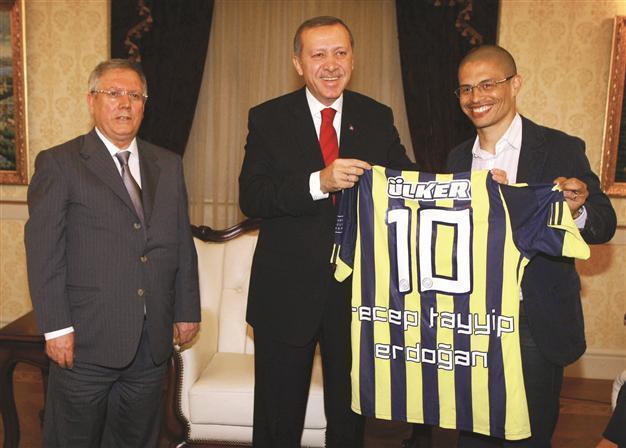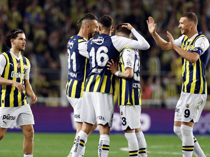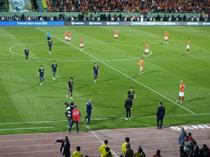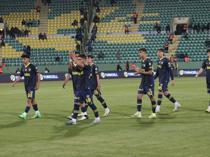Power struggles, match-fixing case, Euro ‘20 woes rock Turkish football
James M. Dorsey

This file photo from April 19, 2011, three months before the match-fixing scandal broke, shows Fenerbahçe captain Alex de Souza (R) giving a jersey to Prime Minister Erdoğan, during a visit with chairman Yıldırım (L).
These are tough days for Turkish football. As if a match-fixing and corruption scandal and a power struggle between two powerful Islamist groups were not enough, expectations have been dashed that the country would win the right to host Euro 2020 hands down have been dashed.Last minute bids by Georgia and jointly by Scotland, Wales and Ireland for the tournament have challenged Turkey and allowed the Union of European Football Associations (UEFA) to give in to pressure by the International Olympic Committee (IOC) to delay its vote on Euro 2020. In a statement this week, UEFA extended its deadline for the submission of bids that formally ended on May 15.
The problem is that Turkey’s ambitions are getting in its own way, with bids made not only for Euro 2020 but also for that year’s Olympic Games. Neither UEFA nor the IOC believes Turkey can host both at the same time. Yet they see Turkey as a good choice for both competitions.
The setback to Turkish ambitions follows the ugly scenes of supporters of Fenerbahçe rioting after their troubled team lost the Turkish league championship to Galatasaray. The loss was all the more painful, as Fenerbahçe are at the center of the match-fixing scandal as well as the Islamist power struggle. In a consolation, Fenerbahçe clinched the Turkish Cup for the first time after 29 years.
PM a football fan
Turkish Prime Minister Recep Tayyip Erdoğan, a former football player and Fenerbahçe supporter, has successfully sought to shield his club from the worst - despite condemning the violence in no uncertain terms - by opposing calls for the harsh punishment by supporters of Fethullah Gülen, a powerful, self-exiled, Pennsylvania-based cleric.
The Turkish Football Federation (TFF), in a controversial moved backed by Mr. Erdoğan, earlier this month cleared Fenerbahçe and 15 others of charges of involvement in match-fixing. The decision came three months after the football body, against Mr. Erdoğan’s wishes, rejected a proposal backed by the prime minister that would have shielded clubs guilty of match fixing from being relegated. The defeat of that proposal prompted the TFF’s three top officials, including its vice chairman, Göksel Gümüşdağ, a brother-in-law of Mr. Erdoğan, to resign.
The surprise TFF vote followed Mr. Erdoğan’s success in driving through Parliament - against the will of President Abdullah Gül, who is believed to be an ally of Mr. Gülen - a bill limiting the punishment of people found guilty of match fixing.
For Mr. Erdoğan, however, to decisively win his match against Mr. Gülen, UEFA will have to endorse the TFF’s decision. UEFA had warned earlier that it would intervene if the Turkish federation’s disciplinary body failed to act before a June 1 deadline to register clubs for European competitions last year. Fenerbahçe was barred from this season’s Champions League as a result of the investigation.
UEFA could opt to extend Fener’s ban, as well as expand it to other prominent clubs implicated in the scandal such as Beşiktaş and Trabzonspor. A UEFA intervention would reflect poorly on Mr. Erdoğan, taint Turkey’s already damaged image and further complicate its bid to host the 2020 European football championship.
The stakes for Messrs. Erdoğan and Gülen are high: the hearts and minds of millions of Turkish football fans - along with the prime minister and Mr. Gülen - are focusing primarily on Fenerbahçe, Turkey’s biggest and best supported club, whose imprisoned president, Aziz Yıldırım, is among 93 football officials and players standing trial on match-fixing charges.
It was not immediately clear what impact the TFF decision would have on the proceedings of the court, which was looking to the federation for guidance. Mr. Gülen is believed to want to see Mr. Yıldırım convicted to pave the way for someone closer to his movement to be able to take control of the club.
Calls to UEFA
The risks for Mr. Erdoğan are evident, as a video demanding that UEFA take action to ensure harsh penalties for those implicated in the match-fixing scandal went viral on the Internet shortly after the TFF announced its decision. “Only UEFA can help us solve this problem, we can’t. If we could we wouldn’t be in this situation,” says a middle-aged football fan in the video, sitting by the Bosphorus as he signs a football ball, alongside others from all walks of life. The ball is to be given to the European football body as a petition for intervention.
It is also politically sensitive, because Mr. Gülen’s movement is Turkey’s foremost Islamic alliance and has traditionally supported Mr. Erdoğan’s Justice and Development Party (AKP). It operates schools, businesses, media and NGOs across the globe, and is widely seen as having significant sway over Turkey’s police force. The Gülen movement has been instrumental in the rise of Turkey’s appeal across the Middle East, North Africa and sub-Saharan Africa, with its network often paving the way for Turkish diplomacy and business.
Followers of Mr. Gülen believe that Ergenekon, an allegedly clandestine, Kemalist ultra-nationalist organization representing Turkey’s deep state, benefitted financially from the match-fixing. Hundreds of people have been arrested, including senior military figures, in recent years on charges for their alleged involvement in Ergenekon, which the government denounces as a terrorist organization.
Extra time for Euro 2020 bids
NYON, Switzerland
UEFA announced that it had launched an additional process which will allow any of its 53 member associations to submit their candidature for the European Football Championship in 2020.
The new process comes after the May 15 deadline, before which Turkey, Georgia and a partnership of Wales, Scotland and the Republic of Ireland had placed bids to host the Euro 2020.
The bidding process will last approximately 18 months to allow candidates to elaborate on their dossiers. A decision on the hosts can be expected in early 2014.
















